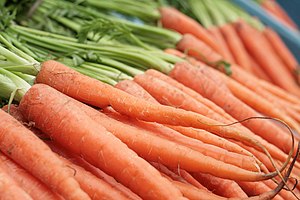
Bioactives refer to natural compounds found in foods that reduce the risk of one or more diseases. Carrots are rich in polyacetylenes that have been correlated to a reduced risk of certain cancers and a variety of other diseases. The compound Falcarinol has been identified as the most active polyacetylene in carrots in terms of its effect on cancer cells in research studies. Dr. Juan Valverde and colleagues focused on a variety of polyacetylenes in carrots that had undergone MAP versus those that had not. MAP is a common way of packaging carrots “sticks” and “chips” for sale.
In their study, two different gas blends were used. Gas 1 consisted of 5% CO2, 5% O2 and 90% N2 while Gas 2 contained 10% CO2, 80% O2 and 10% N2. In addition, each gas blend was used with both polyester -polyethylene and a polyamide-based
breathable material in order to evaluate the effect of the packaging itself. All samples were stored at 4°C for six day with polyacetylene levels determined at days zero, three and six.
The results of the study were clear. Modified Atmosphere Packaging did not diminish the level of any of the three major polyacetylenes found in carrots when compared to the controls.
To read the full article, click here (pdf, page 20).

